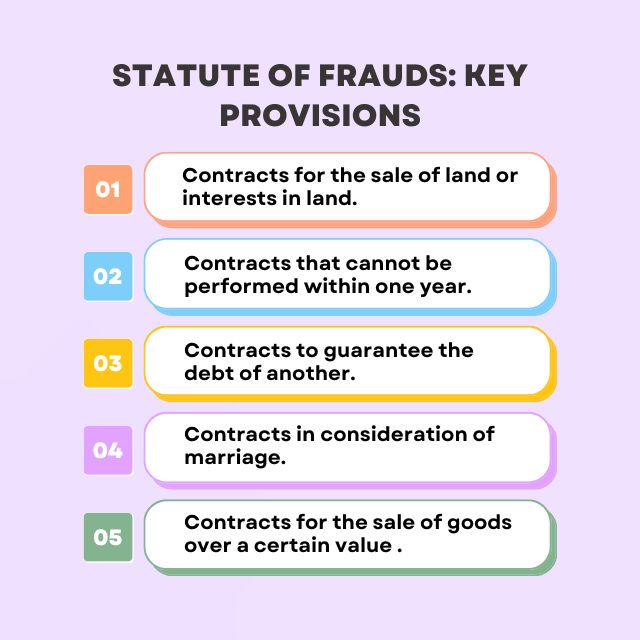The Statute of Frauds, a principle dating back to a 1677 English law, remains a cornerstone in the field of contract law. Its enduring significance lies in its requirement for certain types of contracts to be in writing to be legally enforceable. This legal doctrine not only marks a pivotal development in the historical evolution of contract law but also plays a crucial role in contemporary legal practices by safeguarding against fraudulent claims and ensuring clarity in significant agreements.
Statute of Frauds: Historical Context and Purpose
The original Statute of Frauds was enacted by the English Parliament under King Charles II. The aim was to prevent fraudulent claims and perjuries in court by requiring certain types of contracts to be evidenced in writing. This law marked a significant shift from the reliance on oral agreements and memory, paving the way for a more systematic and reliable approach to contract enforcement.
Statute of Frauds: Key Provisions
The Statute of Frauds mandates that certain types of contracts must be in writing and signed by the party against whom enforcement is sought. These typically include:

- Contracts for the sale of land or interests in land.
- Contracts that cannot be performed within one year.
- Contracts to guarantee the debt of another.
- Contracts in consideration of marriage.
- Contracts for the sale of goods over a certain value (varies by jurisdiction).
Modern Applications and Relevance
In modern legal systems, the Statute of Frauds has been adopted and modified in various jurisdictions, including the United States. While the specifics can vary, the underlying principle remains consistent: to provide clear evidence of a contract’s terms and to prevent fraudulent claims.
Protecting Against Fraud
The primary function of the Statute of Frauds is to prevent fraud in contractual transactions. By requiring written evidence of agreements that are susceptible to disputes or misrepresentations, the statute aims to ensure that the parties involved have a clear and unambiguous record of their agreement.
Clarity and Certainty
Written contracts promote clarity and certainty in business dealings. They provide a tangible record of the terms agreed upon, reducing the likelihood of misunderstandings or forgotten details. This clarity is particularly crucial in complex transactions or agreements that span over a long period.
Legal Challenges and Enforceability
Contracts that fall under the purview of the Statute of Frauds but fail to meet its requirements are generally unenforceable. However, there are exceptions. For instance, partial performance of an oral contract may lead a court to enforce the terms under the doctrine of estoppel, which prevents a party from denying the contract’s existence.
Impact on Business Practices
The Statute of Frauds has a significant impact on business practices. It encourages parties to document their agreements meticulously, particularly in real estate transactions, long-term projects, and significant sales of goods. This requirement for documentation often necessitates legal counsel, thereby promoting professionalism and diligence in business dealings.

Commercial Transactions
In commercial transactions, particularly in the sale of goods and services, the statute plays a critical role. Many jurisdictions have specific provisions for commercial contracts, like the Uniform Commercial Code (UCC) in the United States, which sets the threshold for the required written evidence in sales of goods.
Real Estate Transactions
The statute’s requirement for written agreements in real estate transactions ensures a high level of scrutiny and formality, given the significant value and complexity of such deals. This provision helps in preventing disputes over land ownership and sale terms.
Criticisms and Limitations
Despite its benefits, the Statute of Frauds is not without criticisms. Some argue that it can sometimes unjustly prevent the enforcement of genuine oral agreements, particularly in cases where written documentation is lost or never formalized due to various circumstances.
Evolution and Adaptation
Over the years, the application of the Statute of Frauds has evolved to adapt to changing business practices and technologies. For instance, the rise of electronic communications and contracts has led to questions about what constitutes a “writing” and a “signature” under the statute.
The Role of Judicial Interpretation
Judicial interpretation plays a key role in the application of the Statute of Frauds. Courts often have to consider the intent of the parties and the fairness of enforcing or not enforcing an agreement based on its conformity with the statute.
Conclusion
The Statute of Frauds remains a fundamental aspect of contract law, balancing the need for written evidence of certain types of agreements with the flexibility required to accommodate various circumstances. Its role in preventing fraud, ensuring clarity, and promoting formality in contractual relationships underscores its enduring significance in the legal landscape. As business practices and technologies evolve, so too will the application and interpretation of this pivotal legal doctrine, ensuring its relevance in the ever-changing world of contract law.
Did you find this Legitt article worthwhile? More engaging blogs about smart contracts on the blockchain, contract management software and electronic signatures can be found in the Legitt Blogs section. You may also contact Legitt to hire the best contract lifecycle management services and solutions.
FAQs on Statute of Frauds
What is the Statute of Frauds?
The Statute of Frauds is a legal principle requiring certain types of contracts to be in writing to be enforceable, aiming to prevent fraud and misunderstandings in significant agreements.
Why was the Statute of Frauds created?
It was created to prevent fraudulent claims and perjuries in court by ensuring that significant contracts had written evidence.
Which types of contracts fall under the Statute of Frauds?
Contracts requiring written evidence include those for land sale, agreements not performable within a year, debt guarantees, marriage considerations, and sales of goods over a certain value.
Is an oral contract always unenforceable under this statute?
Not always. Exceptions like partial performance may lead to enforcement under certain circumstances, despite the lack of a written agreement.
How does the Statute of Frauds affect business practices?
It encourages meticulous documentation of agreements, particularly in real estate, long-term projects, and significant sales, promoting clarity and professionalism.
Can electronic communications satisfy the Statute of Frauds?
Yes, electronic communications and signatures can satisfy the requirement for a written contract, adapting to modern technologies and business practices.
Are there exceptions to the Statute of Frauds?
Yes, exceptions include partial performance and estoppel, where a party is prevented from denying a contract's existence due to their actions.
What happens if a contract required by the Statute of Frauds is not in writing?
Generally, such a contract is unenforceable, but exceptions can apply based on specific circumstances and judicial interpretation.
Does the Statute of Frauds apply to all contracts?
No, it applies only to specific types of contracts, such as those involving land, long-term commitments, and significant financial transactions.
How has the Statute of Frauds evolved over time?
Its application has adapted to changes in business practices and technologies, with courts interpreting what constitutes "writing" and "signature" in the digital age.
